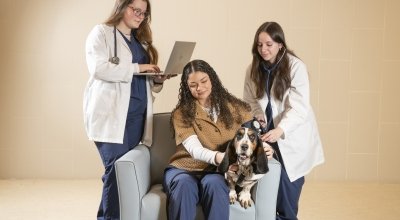
Building Animal Research Connections: Pet therapy program gives nursing students a research edge and a community bond

By Karen Carlo Ruhren
Mix research, practical experience, campus involvement and Ruggles the community resource dog…and you’ve got a winning project. Nursing students at Salve Regina University are well versed in this successful combination, thanks to BARC: Building Animal Research Connections.
Since 2021, undergraduate nursing students, with guidance from Dr. Louise Sullivan, associate professor of nursing, have been working closely with Ruggles, Salve’s favorite black labrador retriever and official community resource dog. Together they are bringing the merits of pet therapy to campus while gaining valuable practice in experiential research. This includes taking blood pressures and heart rates of classmates, processing consent forms and administering surveys. Their efforts take place entirely outside the scope of coursework—a true labor of love.
“I like to think of this as my pet project,” said Sullivan with a smile. “This program offers so much benefit to students. It’s a chance for them to wear lab coats and use stethoscopes, as well as build confidence and provide a stronger connection to their peers and faculty.”
The idea behind BARC began in 2019, when Sullivan was teaching pharmacology. “Students showed me pictures of their pets from home. They missed them very much. And there seemed to be a common love among students and their pets. So I thought, why not use [nursing students’] clinical skills to study the effects of socialization with dogs? We could make this into a nice project.”
Sullivan teamed up with a former member of the student affairs team and enlisted interested nursing students to coordinate a “stressbuster” event during finals, introducing pet therapy dogs to help calm end-of-semester anxieties. About 100 students attended, and Sullivan knew this partnership had potential.
COVID-19 paused their plans, but Sullivan and her students persevered. By mid-2021, when Ruggles (then a puppy) arrived at Salve, the nursing student pet therapy research group had 25 core members.
For Erin Dalton, a junior, the group has become an instrumental part of her Salve experience. “The program helped me step out of my comfort zone,” said Dalton. She recalled taking the course NUR150 Introduction to Professional Nursing with Sullivan, who talked about her beloved dogs and their positive effects in her life.
“I could tell Dr. Sullivan really cared,” said Dalton.
Similarly, junior Kayla Machado felt an instant connection with Sullivan through their shared love of pets. “I was showing Dr. Sullivan photos of my dogs, gushing about how much I missed them. She told me about [the research group] and I was determined to give Dr. Sullivan all the resources she needed.”
Dalton and Machado agreed that to gain traction on campus, the group needed to become a University-recognized organization. With Sullivan as their advisor, they made this a reality in fall 2024, coined the name BARC and formed an executive board. BARC continues to grow and now has over 30 members. Machado serves as the group’s president.
Sophomore Lucy Campbell appreciates the group’s potential for research collaboration. “It opened my eyes to an extremely important part of nursing that I hadn't considered before: research within the nursing field. Knowing that I could be part of the research and data collection as an underclassman feels empowering. I was excited to improve critical nursing skills like measuring blood pressure and talking to patients,” said Campbell. “I feel so lucky that there is a unique opportunity like this to get more involved in the nursing department here at Salve.”
To date, the group has completed seven projects, including five stressbuster events and two studies with Ruggles. The most recent was a randomized crossover study that involved 18 participants exposed to two interventions—a slideshow of their pets and playtime with Ruggles—to measure the response of each sub-group. Nursing students took participants’ blood pressures and heart rates before and after the 15-minute interactions. Results revealed that most students who attended the interactive pet therapy session experienced a decrease in blood pressure and pulse, as well as a decrease in perceived stress and anxiety.
These findings are heartening for the value of pet therapy and encourage additional study. BARC is poised to continue.
“We’re getting more savvy,” noted Sullivan who, with her students, is looking forward to repeating and expanding the study this year. Meanwhile, BARC has been busy. Several student members presented posters at the 2024 SRyou Student Exposition. With Emily Cabral ’23, Dr. Ellen McCarty, professor emerita, and Dr. Emily Wood, a nurse researcher at the University of Sheffield in the United Kingdom, Sullivan co-authored “Engaging Undergraduate Nursing Students in Collaborative Research,” published in the Journal of Nursing Education, October 2024. BARC has also recruited more certified pet therapy dogs who will help with upcoming projects, giving Ruggles some rest.
Sullivan is humbled by the students’ response to the program and encouraged by its progress. “The program helps them feel good about becoming a nurse and broadens their awareness of ways to help patients,” she said. “I’m so proud of the students and couldn’t do any of this without them.”
Dalton, Machado and Campbell agree that the combination of clinical skills and research has expanded their understanding of nursing. Dalton works as a CNA in the emergency department at Backus Hospital in Connecticut, where staff have started to bring in pets to various units. “In the ER, someone could be having the worst day of their life and a simple interaction with a pet can do so much to help,” she said.
Machado, who works as a student nursing intern in the emergency department at Newport Hospital, appreciates the work it takes to get a research program off the ground. She makes sure that all BARC members are certified through the Collaborative Institutional Training Initiative, which permits them to do ethical research with human subjects on campus.
Machado shared, “My goal is to get more nursing students excited about research. I want it to be a concrete organization that can guarantee research opportunities. And what better way than through pet therapy. We’re not only bringing research to Salve; we’re bringing outreach to the student community, too.”
